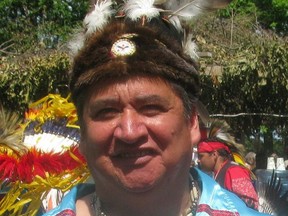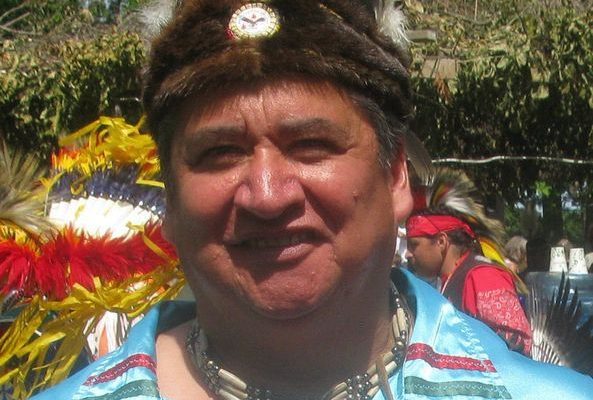
When R. Stacey Laforme won his first of four elections as chief of Mississaugas of the Credit First Nation (MCFN), he ran on a platform of leading the First Nation southwest of Hamilton toward “self-sufficiency and sovereignty, moving slowly away from the Indian Act.”
Laforme, who was first elected as a councilor in 1999, said band members took a major step toward political autonomy from Ottawa when they voted on April 22 to ratify MCFN’s first constitution, which the chief described as a “foundation document” asserting that “we have the inherent right to determine our future.”
The constitution, Laforme added, is also a “declaration” that MCFN has sole jurisdiction to enact laws governing such areas as environmental stewardship, economic development, land use, public works and social services.
Self-government also includes having control over education, which is now constitutionally guaranteed to be offered in the Anishinaabemowin language and highlight traditional Mississaugas cultural teachings.
While MCFN “has never surrendered our sovereignty” as a First Nation, despite colonial pressure, Laforme said the new constitution will improve MCFN’s standing when negotiating with other nations — including Canada — because “a constitution is a document that other governments recognize and respect. ”
Mississaugas of the Credit is a federally recognized band under the Indian Act with nearly 2,600 members, of which just under 1,000 live on the reserve near Hagersville.
Unlike neighboring Six Nations of the Grand River, which saw its system of hereditary government forcibly displaced in the 1920s and an elected council installed by Ottawa, the Mississaugas of the Credit chose in the 1870s to transition to an elected system of their own accord as a survival tactics within the Canadian system.
Extricating MCFN from the Indian Act will allow the First Nation to chart its own course, Laforme said.
“With the Indian Act in conflict with our inherent rights to self-determination, members or people who do not agree with our future decisions can take us to court under the Indian Act, which will in turn make progress for MCFN very slow and challenging, ” he said.
Ratifying the constitution, he added, does not change Canada’s treaty obligations to MCFN, including financial support.
The constitution uses pointed language when talking about band membership, saying MCFN “has the exclusive right and authority to decide its membership without interference.”
“Currently the government of Canada determines who is and who is not a status member of the Mississaugas of the Credit First Nation based on criteria that they maintain under the Indian Act,” Laforme explained.
“This in my opinion remains a form of genocide, for my First Nation and other First Nations continue to disappear from their list as status Indians.”
To Laforme, MCFN should have the ability to determine band membership without Ottawa’s input.
In an email to The Spectator, a spokesperson for Indigenous Services Canada and Crown-Indigenous Relations and Northern Affairs said Ottawa and MCFN “are working together to strengthen their nation-to-nation, government-to-government relationship and advance reconciliation based on community priorities.”
That work “includes exploring joint approaches and arrangements for supporting the First Nation’s vision for greater self-determination and moving out from under the Indian Act toward self-government,” Matthew Gutsch said.
“Community constitutions are one component of the overall work toward negotiated self-government agreements. We look forward to advancing this important ongoing work in partnership with the Mississaugas of the Credit First Nation.”
The referendum on the constitution saw 215 votes tallied, with 128 supporting ratification and 87 against.
That vote turnout is about 22 per cent of the total on-reserve population.
Elections for MCFN chief and seven councilors are held every two years, and the new constitution does not change the council structure. But it does set out governmental and law-making procedures, demanding financial transparency and opportunities for band members to participate in the democratic process.
The document — which can be amended if the proposed change is endorsed by at least 70 per cent of eligible voters — declares Anishinaabemowin and English to be the First Nation’s official languages.
The constitution was developed over several years by a committee that benefited from the legal expertise of former Ontario Court of Appeal Judge Harry LaForme, the first Indigenous appellate judge in Canada.
Stacey Laforme said asserting sovereignty is a long-term project that must also include “economic self-sufficiency” for MCFN. Ratifying the constitution, he said, is a start.
“This is a journey that will take more time than I have remaining, but at least the path is there if we choose to seize it.”
JP Antonacci is a Local Journalism Initiative Reporter based at The Hamilton Spectator. The initiative is funded by the Government of Canada.

Comments
Postmedia is committed to maintaining a lively but civil forum for discussion and encourages all readers to share their views on our articles. Comments may take up to an hour for moderation before appearing on the site. We ask you to keep your comments relevant and respectful. We have enabled email notifications—you will now receive an email if you receive a reply to your comment, there is an update to a comment thread you follow or if a user you follow comments. Visit our Community Guidelines for more information and details on how to adjust your email settings.
Join the Conversation